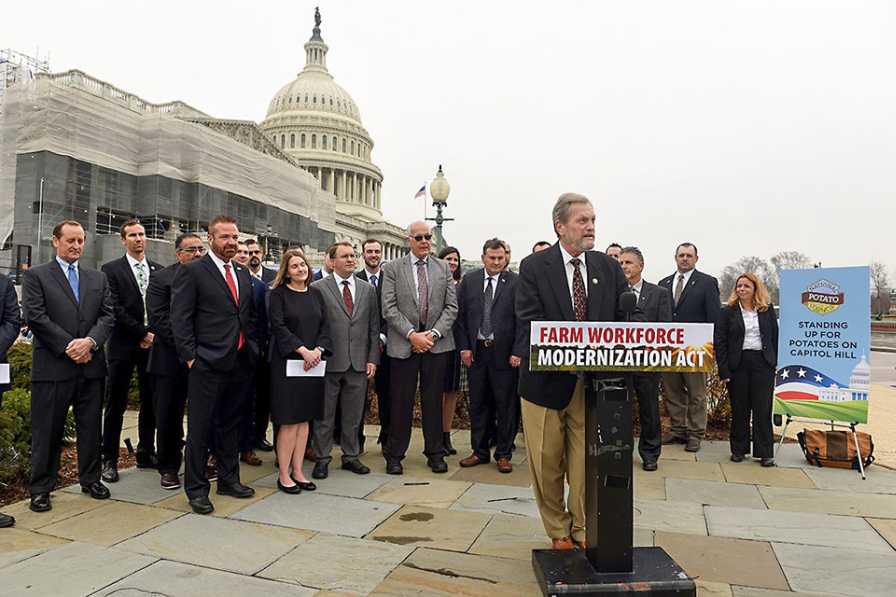Hot Potato: Health of the Industry Ground in Persistence

On February 26 during its annual Potato D.C. Fly-In, the National Potato Council (NPC) held a press conference on the steps of Capitol Hill in support of the bipartisan The Farm Workforce Modernization Act. Attending the press conference were NPC’s Executive Committee, along with bill sponsors and supporters Rep. Mike Simpson, R-Idaho (pictured at podium); Rep. Zoe Lofgren, D-California; Rep. Dan Newhouse, R-Washington; Rep. Jimmy Paneta, D-California; and Rep. Doug LaMalfa, R-California.
Photo courtesy of National Potato Council
As organizations adapt to the current COVID-19 realities, the National Potato Council (NPC) tried something new by holding our first-ever virtual Summer Meeting on June 25. Although disappointed we couldn’t get together in person, the virtual format did have its advantages in that it opened up the meeting to growers and industry members who normally don’t have the flexibility of traveling to our meeting.
The virtual nature of the meeting also allowed us to broadcast live from our Facebook page, where dozens of viewers tuned in to watch the “State of the Industry and COVID-19 Response” presentations by NPC leadership and our partners in the industry.
As part of the presentation, I took a few minutes to reflect on the past year with a great team here in DC.
2020 Has Had Some Good Moments
Just six weeks after January’s record-breaking Potato Expo in Las Vegas, we gathered in Washington for the 2020 Potato D.C. Fly-In. And we made the most of our “Standing Up for Potatoes on Capitol Hill” mission statement. During the week, we hosted an ag labor reform press conference on the steps of the Capitol Building. And five members of Congress and several industry partners joined us.
The industry was also then buoyed by one of the strongest few months for trade wins in memory. The United States-Mexico-Canada Agreement, the U.S.-Japan Trade Agreement, and U.S.-China Phase One all happened in the first quarter of the year. Overall, it was the most successful Fly-In and start to a year that I have been part of during my years with NPC.
Relief Plan During COVID-19
Little did we know that would be one of the last public events held in DC. Just 10 days after the Fly-In, everyone’s world changed dramatically as the country began shutting down. Congress immediately jumped into action, passing a $2 trillion stimulus bill.
Even before the president signed that bill, NPC and the state organizations sat down to figure out a relief plan for the industry. The initial product was a sound one and included two parts:
- Part 1: In the absence of consumer demand due to a government shutdown, we pushed the government to temporarily become our customer and clear out the growing oversupply.
- Part 2: USDA needed to set up a meaningful direct-payment program for the industry to provide relief to impacted growers.
On the first piece, USDA responded by providing us with the largest surplus commodity purchase in our industry’s history, with a $50 million purchase of potatoes.
The second piece has been more difficult. USDA’s first attempt at a direct-payment program did not deliver for the specialty crop industry and certainly not for potatoes.
However, in July we welcomed news that USDA had listened to feedback from the industry and issued revised payment rates for the Coronavirus Food Assistance Program, which previously prevented potato growers from receiving equitable access to relief funds.
Although certain payment rates are still lacking, we continue to work with USDA. We want to ensure that all injured potato growers have an equal opportunity to apply for and seek relief.
Looking Forward
Our industry continues to believe in our recommendations. All potatoes should be equally eligible and with a meaningful payment level of at least $0.04 per pound. That simple, balanced approach ensures relief flows to growers who need support.
Looking forward to a new Congressional COVID stimulus bill, NPC is strongly advocating that resources be provided to assist growers and related facilities with physical distancing and other virus-prevention mandates. We must secure our essential activities for the American economy, and we can only do that with federal partnership on testing, personal protective equipment, housing enhancements, and other expensive yet vital investments.
Although the first half of 2020 wasn’t what we anticipated, the potato industry and the rest of our specialty crop partners are working together to ensure our family farmers are provided the support they need to make it though and beyond this current crisis.










